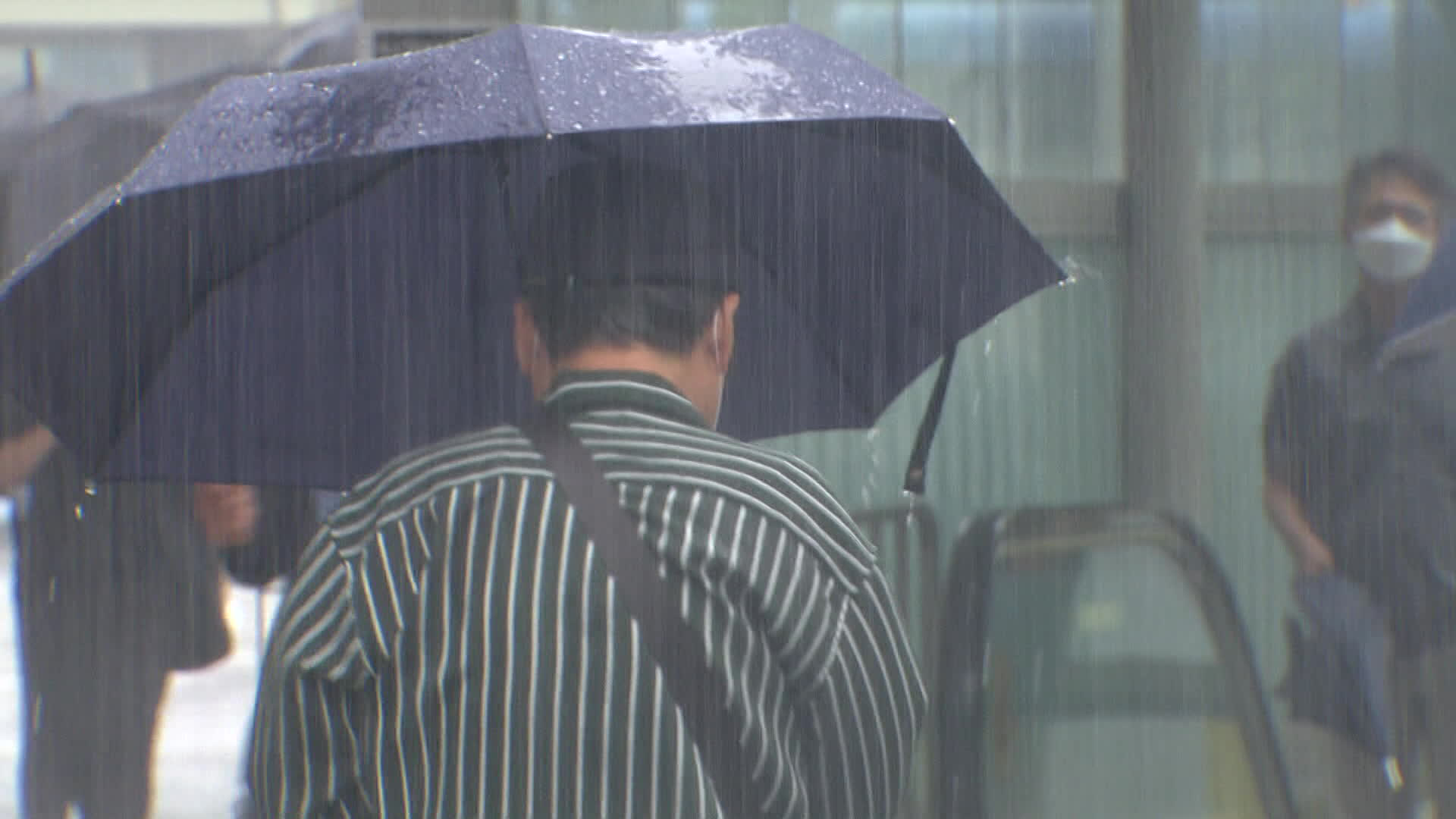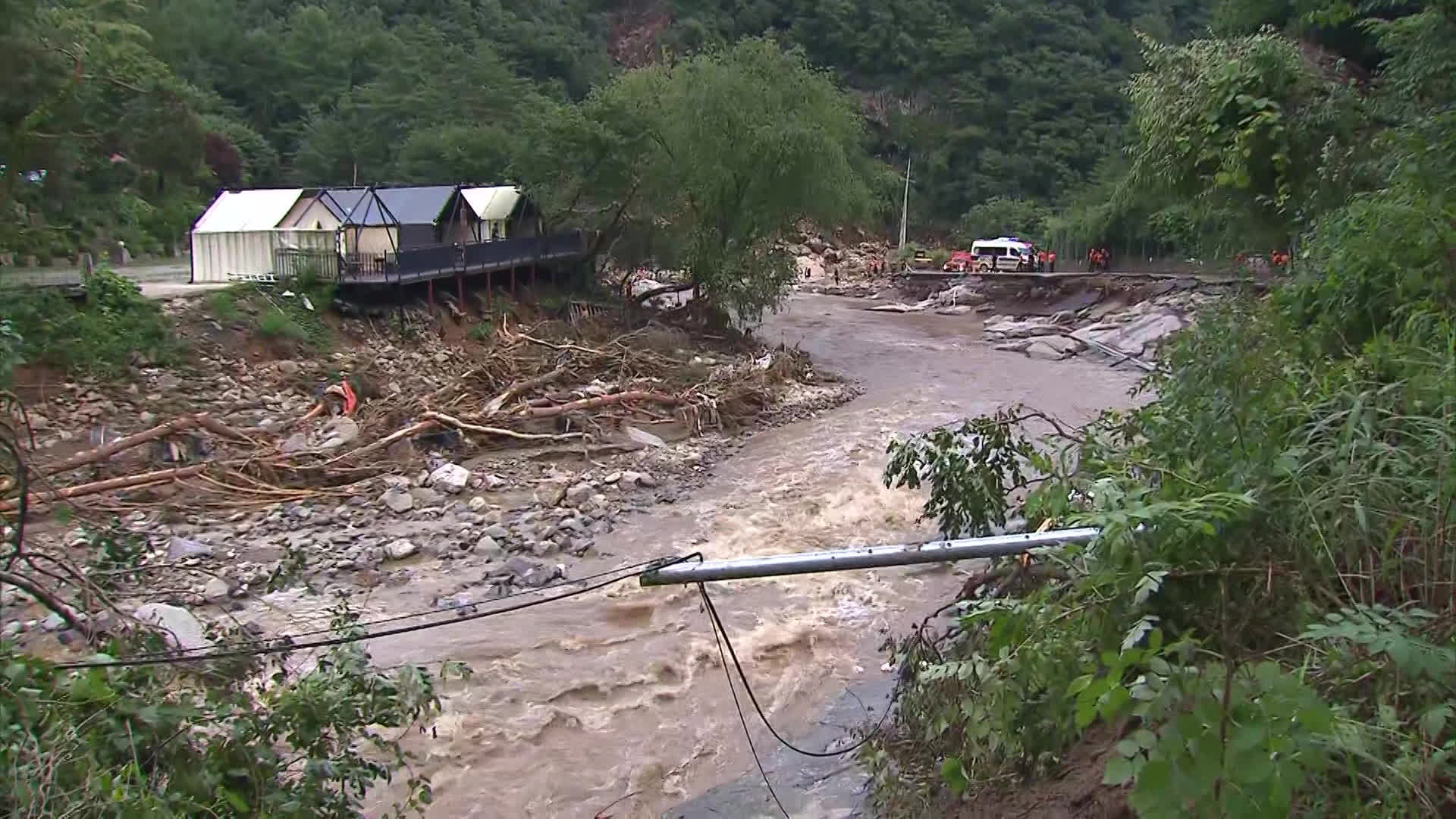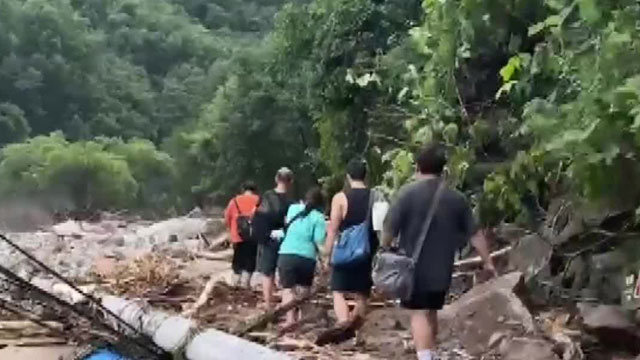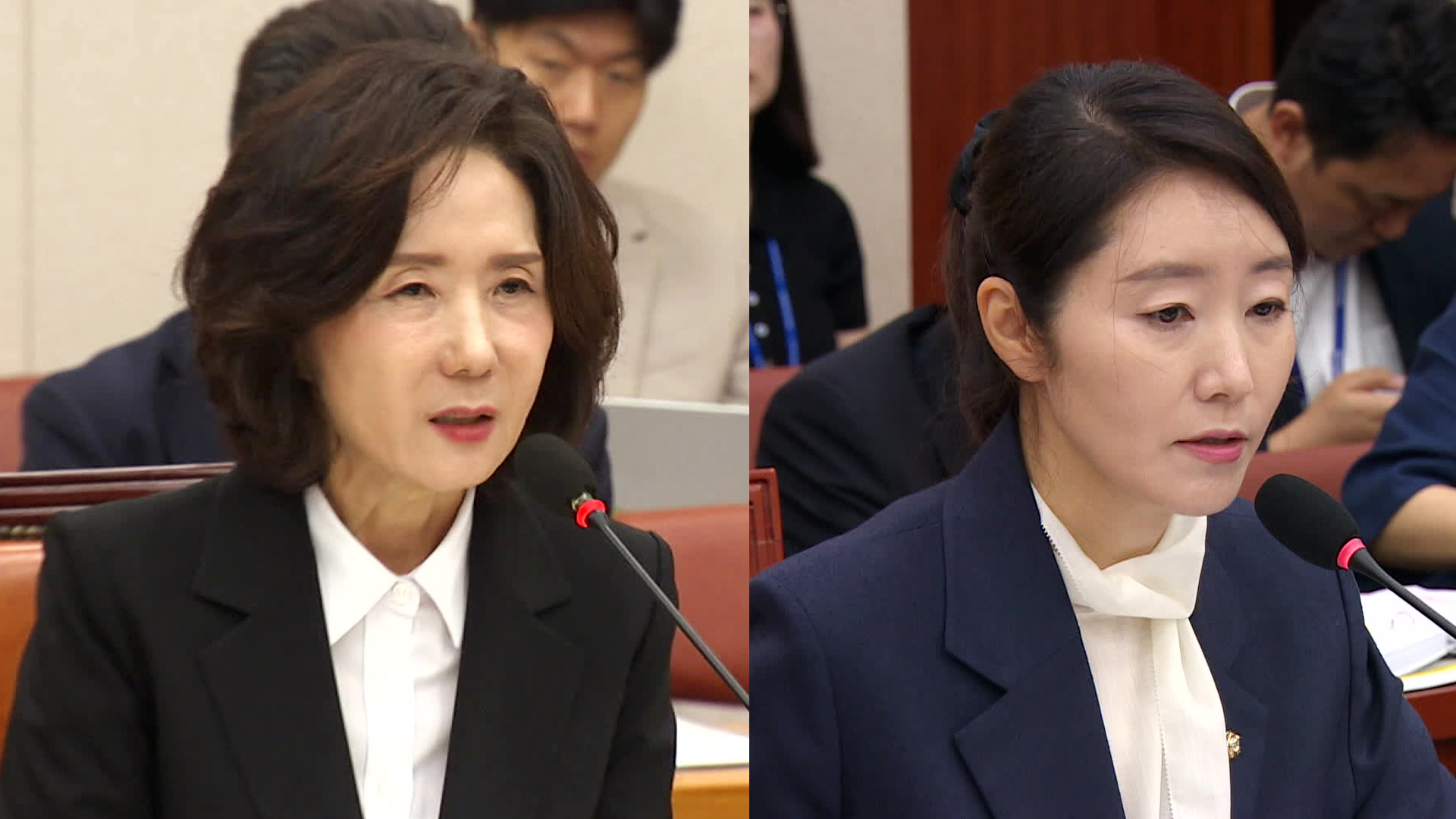Climate change intensifies rainfall
입력 2025.07.21 (03:41)
읽어주기 기능은 크롬기반의
브라우저에서만 사용하실 수 있습니다.
[Anchor]
We typically remember the rainy season as a continuous stretch of humidly sticky and endless downpour.
However, this year is different.
We are experiencing intense downpours that exceed expectations within a short period.
What has caused our rainy season to become so extreme?
Reporter Lee Seul-ki has analyzed the situation.
[Report]
In the darkness, heavy rain pours down as fierce waves flow beneath a bridge.
In Gapyeong, Gyeonggi Province, rain fell at a rate of 75 millimeters per hour.
At this time, a cold air mass known as a 'polar low' was stubbornly lingering near the demilitarized zone.
This low pressure system remained unusually stationary for an extended period, causing rain clouds to stay in the same area and repeatedly unleash concentrated downpours.
[Lee Chang-jae/Meteorological Administration Forecast Analyst: "It is rare for a cold and dry 'polar low' from the north to linger over our country for such a long time during the summer, but because this unusually cold and dry air has continued to flow down..."]
In Sancheong, Gyeongnam, rain also fell at a rate of 100 mm per hour.
In addition to the strong rain clouds, the influence of the nearby Jirisan mountainous terrain compounded the situation.
When humid air meets mountainous terrain, the air rises more rapidly along the slopes, leading to the rapid development of rain clouds.
It is also analyzed that the increase in water vapor in the atmosphere due to global warming has exacerbated the damage.
The more water vapor there is, the stronger the intensity and destructive power of short-term downpours can become.
[Yoon Jin-ho/Professor of Environmental Energy Engineering, Gwangju Institute of Science and Technology: "The more water vapor there is in the atmosphere, the higher the probability of rain, which increases the amount of rainfall..."]
As extreme rainfall becomes a recurring reality due to climate change, a fundamental approach to establishing a resident evacuation system is necessary.
This is KBS News, Lee Seul-ki.
We typically remember the rainy season as a continuous stretch of humidly sticky and endless downpour.
However, this year is different.
We are experiencing intense downpours that exceed expectations within a short period.
What has caused our rainy season to become so extreme?
Reporter Lee Seul-ki has analyzed the situation.
[Report]
In the darkness, heavy rain pours down as fierce waves flow beneath a bridge.
In Gapyeong, Gyeonggi Province, rain fell at a rate of 75 millimeters per hour.
At this time, a cold air mass known as a 'polar low' was stubbornly lingering near the demilitarized zone.
This low pressure system remained unusually stationary for an extended period, causing rain clouds to stay in the same area and repeatedly unleash concentrated downpours.
[Lee Chang-jae/Meteorological Administration Forecast Analyst: "It is rare for a cold and dry 'polar low' from the north to linger over our country for such a long time during the summer, but because this unusually cold and dry air has continued to flow down..."]
In Sancheong, Gyeongnam, rain also fell at a rate of 100 mm per hour.
In addition to the strong rain clouds, the influence of the nearby Jirisan mountainous terrain compounded the situation.
When humid air meets mountainous terrain, the air rises more rapidly along the slopes, leading to the rapid development of rain clouds.
It is also analyzed that the increase in water vapor in the atmosphere due to global warming has exacerbated the damage.
The more water vapor there is, the stronger the intensity and destructive power of short-term downpours can become.
[Yoon Jin-ho/Professor of Environmental Energy Engineering, Gwangju Institute of Science and Technology: "The more water vapor there is in the atmosphere, the higher the probability of rain, which increases the amount of rainfall..."]
As extreme rainfall becomes a recurring reality due to climate change, a fundamental approach to establishing a resident evacuation system is necessary.
This is KBS News, Lee Seul-ki.
■ 제보하기
▷ 카카오톡 : 'KBS제보' 검색, 채널 추가
▷ 전화 : 02-781-1234, 4444
▷ 이메일 : kbs1234@kbs.co.kr
▷ 유튜브, 네이버, 카카오에서도 KBS뉴스를 구독해주세요!
- Climate change intensifies rainfall
-
- 입력 2025-07-21 03:41:43

[Anchor]
We typically remember the rainy season as a continuous stretch of humidly sticky and endless downpour.
However, this year is different.
We are experiencing intense downpours that exceed expectations within a short period.
What has caused our rainy season to become so extreme?
Reporter Lee Seul-ki has analyzed the situation.
[Report]
In the darkness, heavy rain pours down as fierce waves flow beneath a bridge.
In Gapyeong, Gyeonggi Province, rain fell at a rate of 75 millimeters per hour.
At this time, a cold air mass known as a 'polar low' was stubbornly lingering near the demilitarized zone.
This low pressure system remained unusually stationary for an extended period, causing rain clouds to stay in the same area and repeatedly unleash concentrated downpours.
[Lee Chang-jae/Meteorological Administration Forecast Analyst: "It is rare for a cold and dry 'polar low' from the north to linger over our country for such a long time during the summer, but because this unusually cold and dry air has continued to flow down..."]
In Sancheong, Gyeongnam, rain also fell at a rate of 100 mm per hour.
In addition to the strong rain clouds, the influence of the nearby Jirisan mountainous terrain compounded the situation.
When humid air meets mountainous terrain, the air rises more rapidly along the slopes, leading to the rapid development of rain clouds.
It is also analyzed that the increase in water vapor in the atmosphere due to global warming has exacerbated the damage.
The more water vapor there is, the stronger the intensity and destructive power of short-term downpours can become.
[Yoon Jin-ho/Professor of Environmental Energy Engineering, Gwangju Institute of Science and Technology: "The more water vapor there is in the atmosphere, the higher the probability of rain, which increases the amount of rainfall..."]
As extreme rainfall becomes a recurring reality due to climate change, a fundamental approach to establishing a resident evacuation system is necessary.
This is KBS News, Lee Seul-ki.
We typically remember the rainy season as a continuous stretch of humidly sticky and endless downpour.
However, this year is different.
We are experiencing intense downpours that exceed expectations within a short period.
What has caused our rainy season to become so extreme?
Reporter Lee Seul-ki has analyzed the situation.
[Report]
In the darkness, heavy rain pours down as fierce waves flow beneath a bridge.
In Gapyeong, Gyeonggi Province, rain fell at a rate of 75 millimeters per hour.
At this time, a cold air mass known as a 'polar low' was stubbornly lingering near the demilitarized zone.
This low pressure system remained unusually stationary for an extended period, causing rain clouds to stay in the same area and repeatedly unleash concentrated downpours.
[Lee Chang-jae/Meteorological Administration Forecast Analyst: "It is rare for a cold and dry 'polar low' from the north to linger over our country for such a long time during the summer, but because this unusually cold and dry air has continued to flow down..."]
In Sancheong, Gyeongnam, rain also fell at a rate of 100 mm per hour.
In addition to the strong rain clouds, the influence of the nearby Jirisan mountainous terrain compounded the situation.
When humid air meets mountainous terrain, the air rises more rapidly along the slopes, leading to the rapid development of rain clouds.
It is also analyzed that the increase in water vapor in the atmosphere due to global warming has exacerbated the damage.
The more water vapor there is, the stronger the intensity and destructive power of short-term downpours can become.
[Yoon Jin-ho/Professor of Environmental Energy Engineering, Gwangju Institute of Science and Technology: "The more water vapor there is in the atmosphere, the higher the probability of rain, which increases the amount of rainfall..."]
As extreme rainfall becomes a recurring reality due to climate change, a fundamental approach to establishing a resident evacuation system is necessary.
This is KBS News, Lee Seul-ki.
-
-

이슬기 기자 wakeup@kbs.co.kr
이슬기 기자의 기사 모음
-
이 기사가 좋으셨다면
-
좋아요
0
-
응원해요
0
-
후속 원해요
0















이 기사에 대한 의견을 남겨주세요.